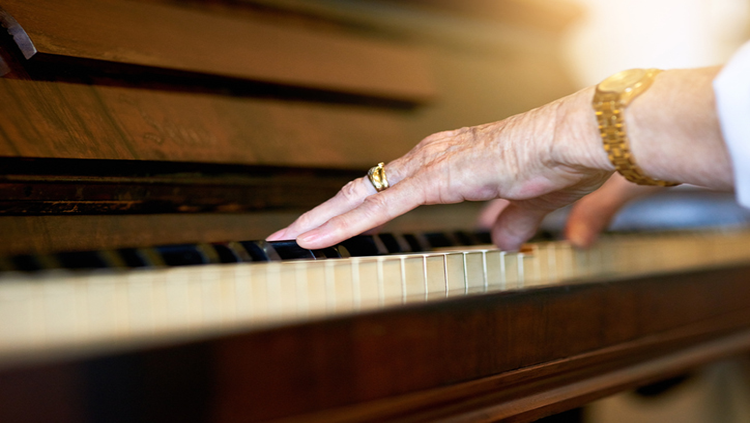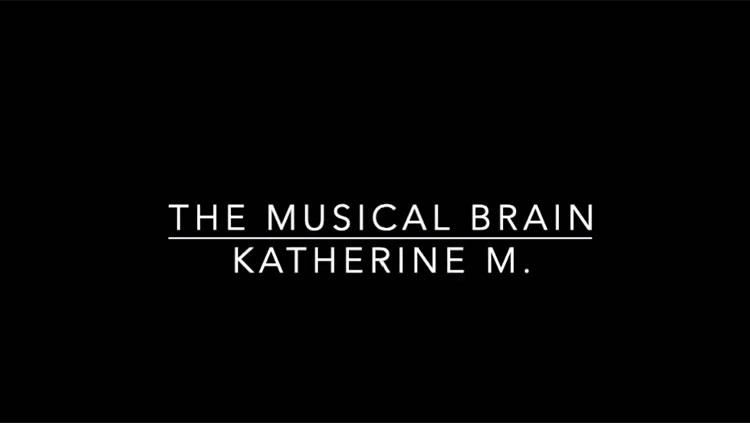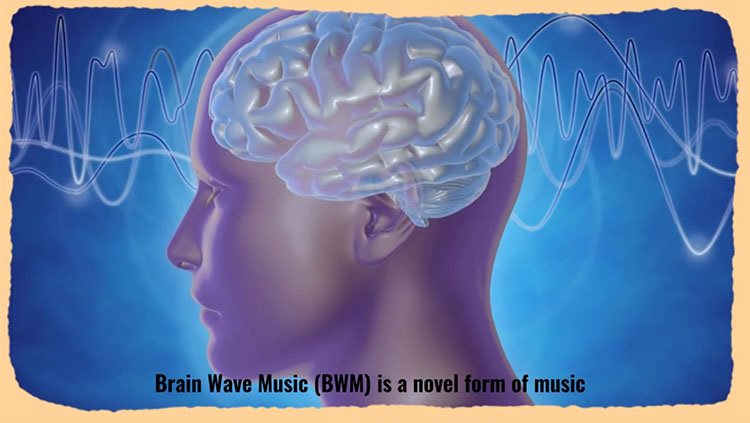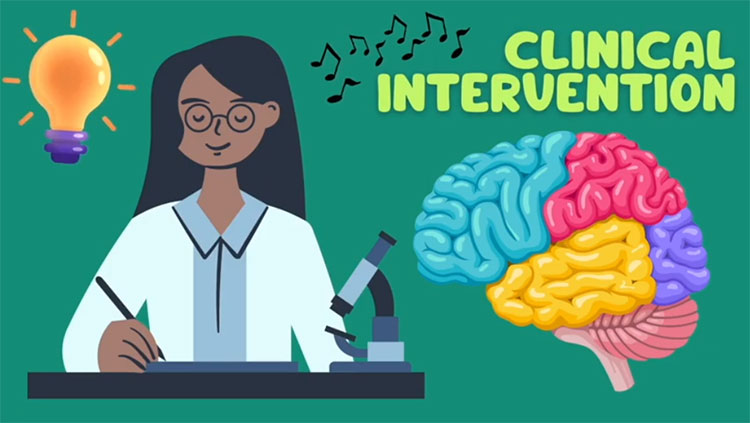Lessons in Music for the Healthy Aging Brain
- Published12 Aug 2020
- Author Patricia Izbicki
- Source BrainFacts/SfN

Something almost like magic happened when Jennifer Bugos played music for her grandparents.
“My grandfather with dementia, who could barely utter a complete sentence, sang all of the words to the Battle Hymn of the Republic,” recalls Bugos, now a professor at the University of South Florida. “My grandmother with Alzheimer’s disease, who was in a complete vegetative state, was moving her big toe to the steady beat of the music.”
Their reactions inspired Bugos to investigate how music training could help older adults in the hope of preventing these advanced disease states or potentially mitigating cognitive deficits.
Bugos developed a piano intervention for older adults who never played an instrument. For three hours a week, participants learned music theory (reading music), technical exercises (playing scales), and musical pieces from an introductory course book. After six months, participants showed improvement in cognitive skills like attention, multi-tasking, and memory. “Music is a very powerful stimulus that contributes to cognitive and emotional responses,” says Bugos. “Despite physical and cognitive deficits, music has the capacity to break down barriers.”
Although hearing, working memory, and other cognitive skills decline with age, studies show people who participate in a little musical practice may be able to gain or maintain these skills. Scientists have learned a lot about the how playing music affects the brain by studying musicians. Compared to older adults with no music training, older musicians can hear better in noisy environments and have better working memory and cognitive control.
In a 2018 study, researchers found musicians have “younger-looking brains.” The researchers took MRI scans of professional musicians, amateur musicians, and non-musicians to compare how their brains were aging.
“The difference between estimated and chronological age [of the brain] is called BrainAGE [Brain Age Gap Estimation] and now provides information about whether the aging process in the brain is accelerated or slowed down,” says Christian Gaser, one of the study authors and a professor at Jena University Hospital.
A low BrainAGE score indicated the brain was aging slowly, while a high score corresponded to accelerated aging. Musicians had lower scores than non-musicians, and less signs of brain aging like the regional brain shrinking typically observed in the brains of older people. Notably, the amateur musicians had even lower scores than professional musicians — their brains were aging slowest. Gaser and his colleagues speculate this may be because amateurs don’t have the stressors from playing music for a living. “Those who only play a musical instrument in their free time may not only have more fun making music, but also the rejuvenating effect on the brain is more pronounced here as stress factors, as with professional musicians, are eliminated,” he says.
Playing music could be associated with cognitive benefits because it’s an exercise session for the brain. “Playing a musical instrument is a whole brain workout,” says Jessica Strong, a clinical geropsychologist and assistant professor of psychology at the University of Prince Edward Island. As you play, you need to coordinate your hands and fingers (and sometimes your feet), while also suppressing excessive movements. In addition to dealing with physical movement, you’re also interpreting and following the sheet music. All the while you’re focusing your attention on the music and ignoring distractions.
In the auditory cortex, those changes can last, Strong notes. One study found older adults who had not played an instrument in over 40 years showed faster neural responses to auditory stimuli than individuals who had never played an instrument. The early musical experiences may set up individuals to interact auditorily with the world in a particular way for the rest of their lives.
“Even if an older adult has not played an instrument in a while, there are lasting brain changes in terms of volume or density of particular areas or structures of the brain from having played an instrument earlier in life,” says Strong.
In 2018, Strong examined cognitive differences among older active musicians, former musicians, and non-musicians. Participants received tests analyzing their working memory, processing and attention, executive functioning skills, and visuospatial abilities, which help you navigate the environment. Participants with music training scored better in language comprehension, planning, and attention. Strong’s findings from this study lined up with previous research. She notes, “Replicating and extending findings really lends more support for the relationship between playing a musical instrument and late-life cognition.”
In 2019, Claude Alain and his team at the Rotman Research Institute examined how music training impacts older adults’ brain activity. The researchers recruited older adults to participate in either a music or visual arts intervention. Participants completed tests measuring verbal comprehension, working memory, and cognitive control. After three months, adults in the music intervention showed greater inhibitory control — they could ignore irrelevant information to stay on track. “Short-term visual arts and music training can boost the brain health of older adults. This is remarkable given the training was only for three months,” says Alain.
While scientists have learned a lot about the relationship between music and the aging brain, there’s still more to discover. For example, what’s happening in the brain when people play music and why is it causing positive effects?
“We need to get at the mechanisms behind the music training and which pieces of music training contribute to the improvements we are observing,” says Bugos.
Still, it’s never too late to start playing.
Additional reporting and writing by Hannah Zuckerman.
CONTENT PROVIDED BY
BrainFacts/SfN
References
Altenmüller, E., Wiesendanger, M., & Kesselring, J. (Eds.). (2006). Music, Motor Control and the Brain. Oxford, UK: Oxford University Press. doi: 10.1093/acprof:oso/9780199298723.001.0001
Amer, T., Kalender, B., Hasher, L., Trehub, S. E., & Wong, Y. (2013). Do Older Professional Musicians Have Cognitive Advantages? PLOS ONE, 8(8), e71630.
doi: 10.1371/journal.pone.0071630
Beard, J. R., & Bloom, D. E. (2015). Towards a comprehensive public health response to population ageing. The Lancet, 385(9968), 658–661. doi: 10.1016/S0140-6736(14)61461-6
Brown, R. M., Zatorre, R. J., & Penhune, V. B. (2015). Chapter 4—Expert music performance: Cognitive, neural, and developmental bases. In E. Altenmüller, S. Finger, & F. Boller (Eds.), Progress in Brain Research (Vol. 217, pp. 57–86). doi: 10.1016/bs.pbr.2014.11.021
Bugos, J. A., Perlstein, W. M., McCrae, C. S., Brophy, T. S., & Bedenbaugh, P. H. (2007). Individualized Piano Instruction enhances executive functioning and working memory in older adults. Aging & Mental Health, 11(4), 464–471. doi: 10.1080/13607860601086504
Chatterji, S., Byles, J., Cutler, D., Seeman, T., & Verdes, E. (2015). Health, functioning, and disability in older adults—Present status and future implications. Lancet (London, England), 385(9967), 563–575. doi: 10.1016/S0140-6736(14)61462-8
Cheever, T., Taylor, A., Finkelstein, R., Edwards, E., Thomas, L., Bradt, J., … Collins, F. S. (2018). NIH/Kennedy Center Workshop on Music and the Brain: Finding Harmony. Neuron, 97(6), 1214–1218. doi: 10.1016/j.neuron.2018.02.004
Chen, J. L., Penhune, V. B., & Zatorre, R. J. (2008). Listening to Musical Rhythms Recruits Motor Regions of the Brain. Cerebral Cortex, 18(12), 2844–2854. doi: 10.1093/cercor/bhn042
Drake, C., & Palmer, C. (2000). Skill acquisition in music performance: Relations between planning and temporal control. Cognition, 74(1), 1–32. doi: 10.1016/S0010-0277(99)00061-X
Franke, K., & Gaser, C. (2019). Ten Years of BrainAGE as a Neuroimaging Biomarker of Brain Aging: What Insights Have We Gained?. Frontiers in neurology, 10, 789. Doi: 10.3389/fneur.2019.00789
Grassi, M., Meneghetti, C., Toffalini, E., & Borella, E. (2017). Auditory and cognitive performance in elderly musicians and nonmusicians. PLOS ONE, 12(11), e0187881.
doi: 10.1371/journal.pone.0187881
Hanna-Pladdy, B., & MacKay, A. (2011). The relation between instrumental musical activity and cognitive aging. Neuropsychology, 25(3), 378–386. doi: 10.1037/a0021895
Harper, S. (2014). Economic and social implications of aging societies. Science, 346(6209), 587. doi: 10.1126/science.1254405
Heise, K.-F., Zimerman, M., Hoppe, J., Gerloff, C., Wegscheider, K., & Hummel, F. C. (2013). The aging motor system as a model for plastic changes of GABA-mediated intracortical inhibition and their behavioral relevance. The Journal of Neuroscience: The Official Journal of the Society for Neuroscience, 33(21), 9039–9049. doi: 10.1523/JNEUROSCI.4094-12.2013
https://www.nih.gov/research-training/medical-research-initiatives/sound-health Neuron Paper
Jefferson, A. L., Paul, R. H., Ozonoff, A., & Cohen, R. A. (2006). Evaluating elements of executive functioning as predictors of instrumental activities of daily living (IADLs). Archives of Clinical Neuropsychology: The Official Journal of the National Academy of Neuropsychologists, 21(4), 311–320. doi: 10.1016/j.acn.2006.03.007
Krampe, R. Th., & Ericsson, K. A. (1996). Maintaining excellence: Deliberate practice and elite performance in young and older pianists. Journal of Experimental Psychology: General, 125(4), 331–359. doi: 10.1037/0096-3445.125.4.331
Levitin, D. J. (2006). This is your brain on music: The science of a human obsession. New York, N.Y: Dutton.
Mansens, D., Deeg, D. J. H., & Comijs, H. C. (2018). The association between singing and/or playing a musical instrument and cognitive functions in older adults. Aging & Mental Health, 22(8), 970–977. doi: 10.1080/13607863.2017.1328481
Mas-Herrero, E., Dagher, A., & Zatorre, R. J. (2018). Modulating musical reward sensitivity up and down with transcranial magnetic stimulation. Nature Human Behaviour, 2(1), 27–32.
doi: 10.1038/s41562-017-0241-z
Mattay, V. S., Fera, F., Tessitore, A., Hariri, A. R., Das, S., Callicott, J. H., & Weinberger, D. R. (2002). Neurophysiological correlates of age-related changes in human motor function. Neurology, 58(4), 630. doi: 10.1212/WNL.58.4.630
Menon, V., & Levitin, D. J. (2005). The rewards of music listening: Response and physiological connectivity of the mesolimbic system. NeuroImage, 28(1), 175–184.
doi: 10.1016/j.neuroimage.2005.05.053
Milham, M. P., Erickson, K. I., Banich, M. T., Kramer, A. F., Webb, A., Wszalek, T., & Cohen, N. J. (2002). Attentional Control in the Aging Brain: Insights from an fMRI Study of the Stroop Task. Brain and Cognition, 49(3), 277–296. doi: 10.1006/brcg.2001.1501
Moreno, S., & Bidelman, G. M. (2014). Examining neural plasticity and cognitive benefit through the unique lens of musical training. Music: A Window into the Hearing Brain, 308, 84–97.
doi: 10.1016/j.heares.2013.09.012
Rogenmoser, L., Kernbach, J., Schlaug, G., & Gaser, C. (2018). Keeping brains young with making music. Brain Structure and Function, 223(1), 297–305. doi: 10.1007/s00429-017-1491-2
Rosenkranz, K., Williamon, A., & Rothwell, J. C. (2007). Motorcortical excitability and synaptic plasticity is enhanced in professional musicians. The Journal of Neuroscience : The Official Journal of the Society for Neuroscience, 27(19), 5200–5206. doi: 10.1523/JNEUROSCI.0836-07.2007
Rowe, J. W., & Kahn, R. L. (1997). Successful Aging. The Gerontologist, 37(4), 433–440.
doi: 10.1093/geront/37.4.433
Seidler, R. D., Bernard, J. A., Burutolu, T. B., Fling, B. W., Gordon, M. T., Gwin, J. T., … Lipps, D. B. (2010). Motor control and aging: Links to age-related brain structural, functional, and biochemical effects. Neuroscience and Biobehavioral Reviews, 34(5), 721–733.
doi: 10.1016/j.neubiorev.2009.10.005
Seinfeld, S., Figueroa, H., Ortiz-Gil, J., & Sanchez-Vives, M. V. (2013). Effects of music learning and piano practice on cognitive function, mood and quality of life in older adults. Frontiers in Psychology, 4, 810–810. doi: 10.3389/fpsyg.2013.00810
Strong, J. V., & Mast, B. T. (2019). The cognitive functioning of older adult instrumental musicians and non-musicians. Aging, Neuropsychology, and Cognition, 26(3), 367–386.
doi: 10.1080/13825585.2018.1448356


















